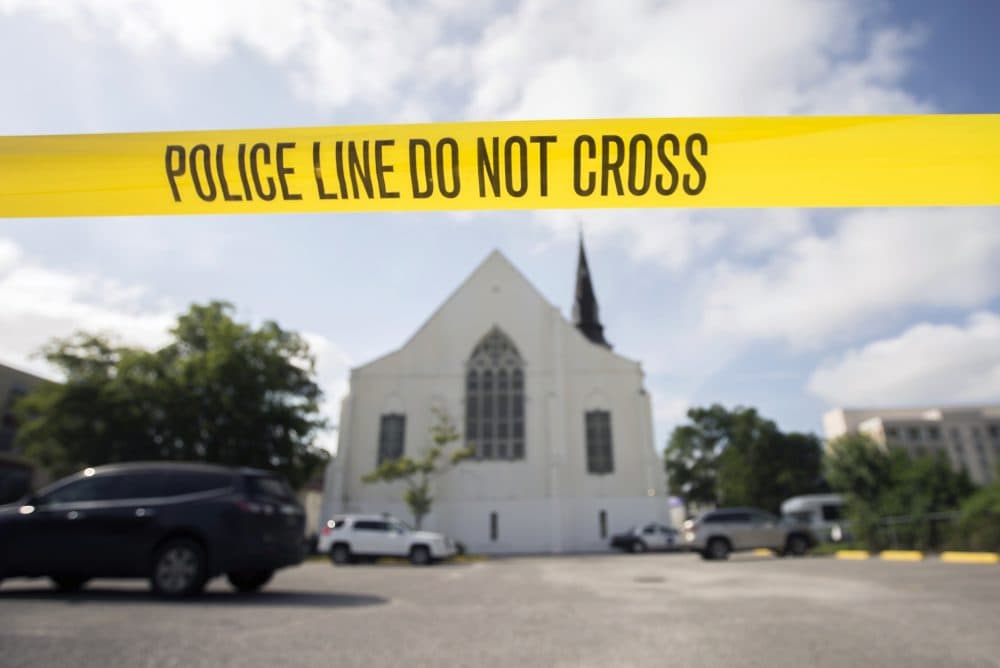Advertisement
Could Dylann Roof Become A Martyr For White Supremacists?

Dylann Roof has chosen to represent himself during the sentencing phase of his trial. As he awaits his fate, what are white supremacist organizations saying about him?
Here & Now's Meghna Chakrabarti talks with Robert Futrell, a professor of sociology at the University of Nevada, Las Vegas and co-author of "American Swastika: Inside the U.S. White Power Movement’s Hidden Space of Hate," about how Roof's trial is resonating among white supremacists.
Interview Highlights
On what white supremacist groups are saying about Roof's trial
"They do seem to be following it, they followed it since he had the massacre... He's a complicated person within the movement. Some people talk about him as sacrificing himself for the white race, as a fed-up white man who knows the truth about racialism, some think he's pushed them closer to what they call the 'fate that lies ahead,' which they imagine is a race war, and they talk about white genocide, and they also talk about exterminating those who would promulgate white genocide, which means blacks, Jews, that sort of thing.
"On the other hand, some feel that Dylann Roof brought unwanted attention, that it's a bad tactic to engage in the violence right now, or when he did, that it brings the kind of spotlight that many of those who call themselves 'white nationalists,' or the 'alt-right,' don't want, because they're seeking more legitimate forms of power."
On Roof being viewed as a martyr if he receives the death penalty
"That may be what Roof himself is thinking. To not take counsel, to avoid a mental health assessment, those things... he doesn't feel like he's wrong, and he feels like his actions stand for themselves — his manifesto is out there, and I think that he feels, to the extent that we can sort of get inside his mind, I think that he feels that his martyrdom is the meaning for what he's, for him, accomplished, so to speak."
"He's a complicated person within the movement."
Robert Futrell
On how Roof first encountered white supremacist ideology
"The Council of Conservative Citizens is one of the places that he went, and he cites them as inspiration. That group itself is a modern version of the old White Citizens Councils, formed by segregationists in the 1950s and '60s... These are so-called upstanding, respectable [groups], some people connected to them are connected to institutional politics. They feel that God is the author of racism, they think race mixing is blasphemy. They condemned the killings, but they also said that Roof had legitimate grievances, so they didn't completely disavow themselves.
"The Council of Conservative Citizens is just one of many places online where one can go and, not just read about, but interact with other white supremacists. So Roof has been characterized as being 'self-radicalized,' and I really take issue with that connotation. He acted alone, but the ideas that he reflects in his manifesto and that inspired him, come from a much broader culture of virulent racist, anti-Semitic ideas, and out of this we can expect — and we've seen it before — people spinning out of this culture, people like Dylann Roof, or Wade Michael Page, who had the massacre at the Sikh temple in Milwaukee, or Frazier Glenn Miller in Kansas City, spinning out of this culture, lashing out at their racial enemies to 'save white America,' and save this culture that is really persistent, quite frankly."
Advertisement
On the legacy of actions like Roof's among white supremacists
"In the same way that Dylann Roof gets talked about, again, some feeling that these are justified responses. But again, there's debate within the white supremacist community about what strategies are the best at this time — or at any time, really, and it's been ongoing for quite a while. But what's happening more recently is that racial extremists, say like Richard Spencer, or the Council for Conservative Citizens, have been working to sort of re-frame their rhetoric to appeal to more moderate, more mainstream conservative whites, who would otherwise disavow overt affiliation with white supremacy. So they're trying to neutralize the stigma that's been associated with white supremacy, and they do this by calling it 'Eurocentric pride,' or 'white heritage preservation,' or 'white nationalism,' or, most recently, 'alt-right.'
"This is sanitized white supremacy, and what they're doing is seeking to draw in patriotic white Americans, as they call them, and secure some degree of political power, and in this context, where you have the president-elect who, during the campaign, did things like retweet from an account called 'WhiteGenocideTM,' I mean that is a clear signal — whether Donald Trump intended it or not — a clear signal to white supremacists that, as they said on Stormfront, the largest white supremacist website, when he was elected, they say, 'We finally have one of us in the White House again.' So the violence may be moderated while they seek this institutional power that they feel that they are entitled to. The complication is, if they don't attain the kind of political power they feel entitled to during Trump's presidency, we may see a new wave of violence by those frustrated by the limits of institutionalized politics, and more folks spinning out from this culture."
This segment aired on January 3, 2017.